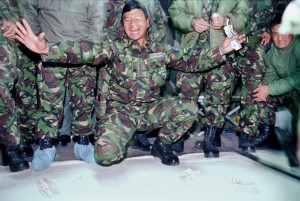Despite being Libya’s former colonizer and the most proximate European country to the failing state, Italy has doubled down on its refusal to send troops to the country. Instead, that responsibility will be borne by Nepalese peacekeeping soldiers, who come from a country still debilitated by a massive earthquake a year ago, as well as sometimes violent protests by an ethnic minority that led to a shutdown of its vital border crossings with India for months.
Matteo Renzi, Italy’s prime minister, said his country would be taking a “different road,” a day ahead of talks on Monday in Vienna aimed at coordinating an international response to Libya’s descent into anarchy. That meeting will be attended by U.S. Secretary of State John Kerry.
Reports in March seemed to suggest that Italy might send up to 5,000 troops, and the U.S. ambassador to Rome spoke publicly about that prospect. By late April, that number was said to be closer to 900. But on Sunday the Italian newspaper Corriere della Serra reported that the U.N. Support Mission in Libya (UNSML) would instead be bolstered by Nepalese troops.
Nepal is one of the world’s top 10 providers of U.N. peacekeepers, and has committed to provide up to 5,000 of them should the U.N. request them. As of earlier this May, Nepal already provides 4,363 peacekeepers to 15 U.N. missions, including Haiti, South Sudan, the Democratic Republic of Congo, Syria and Lebanon.
The Libyan coast is only roughly 300 miles from Italy’s, and instability in Libya has serious ramifications for Italy. Taking advantage of Libya’s lawlessness, tens of thousands of refugees, mostly from sub-Saharan Africa, make their way to Libya’s coasts, where they board rickety boats bound for Italy. More than 30,000 have made the voyage this year alone, and those numbers are expected to go up as Greece complies with a European Union agreement with Turkey mandating all refugees landing there be sent back.
After the U.S.-backed overthrow and killing of Moammar Gaddafi in 2011, chances for stability in Libya have dimmed as political factions turned against each other, resorting to warfare, and kicking off fierce battles that have seen many of the country’s major cities, such as Benghazi, transformed into battlefields. Part of Libya’s coast is now also controlled by the Islamic State, which has its largest branch there outside of its stronghold in Syria and Iraq.
A U.N.-backed “unity government” installed in March has done little to calm the violence. According to a March report in Reuters, Italian officials have said 40 secret service agents operate in Libya, and, at the time, an additional 50 special forces operatives were set to join them.
A unspecified group took four Italian employees of a construction company hostage last July, eventually killing two of them, while the other two escaped in March. The Washington Post recently reported that two teams of American special-ops troops, totaling less than 25 men, have been stationed in Libya since late 2015, and that the U.S. has carried out targeted air strikes twice since then.
“Should Italy have reason to think that the safety of the country is at risk,” Italian Defense Minister Roberta Pinotti told The Post earlier this month, “obviously we are willing to take any necessary step” against the Islamic State.
washingtonpost.com



